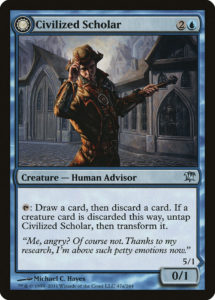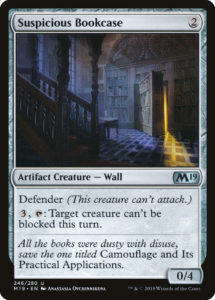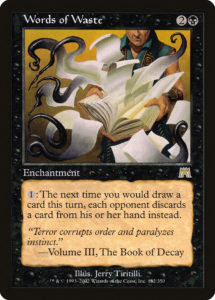“Well, now,” the Count said, with all the false modesty of a man who expects to be flattered. “What do you think of my collection?”
Fortunately for the travelling scholar, he could have been fulsome in his praise, even if he hadn’t detected his host’s cloying tone. “I’ve never seen it’s equal,” the scholar said, and meant it.
“It is, I fear, a mere trifle,” the Count said, “when compared to the great vampire houses, who have had generations to amass their collections. Still, for a mere provincial noble, I fancy I have done rather well.”
There was brandy laid out on a sideboard. The Count poured himself a drink, then offered the same to his guest, who declined.
“I fear my collection is rather limited, at least in the scope of its subjects,” the Count said, holding the snifter with long, delicate fingers. “Medicine, mostly. Anatomy. Local history. The occult. Subjects of personal and professional interest. But I gather that is why you are here?”
“Yes,” the travelling scholar said. “My name is Moser Rolf, and I am – or, rather, I was – partner to the great chirurgeon, Arnold Grunvalt. I, too, am a physician in my own right, although my interests are wholly academic, and I myself do not practice.” The scholar cleared his throat. “From the diaries of my colleague, we gather that he had written to you to seek an audience on the subject of nervous possession.” The scholar – a man of nervous disposition himself – cleaned his spectacles. “However,” he said, “Doctor Grunvalt has not been seen in some time, and we fear he has been lost upon the roads.”
“The highways in these parts are in a deplorable state,” the Count said. “One is almost afraid to leave one’s home.”
“We feared just as much,” the scholar said, and blew on his lenses. “Still, Doctor Grunvalt’s researches are too vital to perish, so I have come to consult in his stead.”
“Grunvalt?” the Count said, rolling the name on his tongue. “Grunvalt… Grunvalt… Ah, yes! I do remember that man!” He snapped his fingers – a dry, bony sound. “Yes, I had a letter from this man – Grunvalt – some many months back, seeking to consult both my books and myself.
The Count stared up at the ceiling, as though racking his memory.
“Yes, Grunvalt,” he said. “I wrote him a letter back, inviting him to call at his earliest convenience. But the months have gone by, and as I had no reply, I assumed that the man had lost interest.” The Count finished his brandy. His mouth was drawn, his features grave. “If it is true what you say, that some misfortune has befallen this poor man, then I cannot help but feel responsible.”
“Oh, I am sure you bear no responsibility,” the scholar hurriedly said. “But now that I am here, perhaps you could show me your books?”
“Yes, yes, of course,” the Count said, brightening at that. “If you will just come with me?” And he led the scholar through the towering stacks, providing commentary as they went.
The Count’s library occupied much of the ground floor of his ancestral manse, overlooking the sanitarium below – an institution for which the Count was both noble benefactor and resident physician. The library’s shelves rose up to the very top of the high, vaulted ceiling, and practically sagged beneath the weight of their accumulated works. Books of every conceivable size and shape were held in place with iron chains, and interspersed at varied intervals with medical-themed curiosities – a set of pithing needles, a phrenological bust, a trepanist’s blade. The anatomical specimens were accompanied by ivory cards, each lettered in a careful, precise hand: “mandible with incisor of lesser werewolf,” one such card said, “recovered from the second stomach of a gitrog toad.” The uppermost shelves would have been inaccessible without aid of a ladder, which ran along the stacks on a track, and the scholar noted with considerable admiration that even the books on these top shelves seemed to be meticulously dusted.
“Your library is a marvel,” the scholar said. He stood next to the trepanist’s blade, and ran his finger across the edge, only to draw it back with a start – the blade was razor sharp.
The Count acknowledged the scholar’s compliment with a bow. “I am a fervent believer,” he said, “in the acquisition and preservation of knowledge. A man’s thoughts are far too precious to remain imprisoned in his head. In their extraction lies our hope for survival.”
“Survival?” the scholar said.
“Survival across the ages,” the Count said. “The immortality of the mind. After all, what a fragile vessel is man?” The Count tapped his own head. “But a book?” He smiled. “A book, my friend, lives on.”
“Ah,” said the scholar. “Quite right.”
The Count again bowed.
“I’m afraid I have no central index,” he said. “I get few learned visitors, you see, situated as remotely as I am, and I myself know the location of every tome. However, the books are grouped by subject, with a small key at the foot of each shelf. And besides,” the Count smiled, “you seem the enterprising sort, so I am sure you will find what you seek. In the meantime, I fear, duty calls me back to the sanitarium, where I must soon take up my rounds. But I shall look in upon you this evening – when I trust you will join me for supper – at which time I shall render whatever assistance I can.” The Count bowed once more. “I am entirely at your disposal.”
“Thank you,” the scholar said. “I shall detain you no longer.”
“In that case,” the Count said, “I will beg that you grant me my leave, but – before I go – I shall impose upon you for one thing.” And, beckoning with a crooked finger, the Count led the scholar back to the library’s furthermost corner, where the light from the windows barely reached, and geistflame lamps flickered among the shelves. Running his hand along the underside of the wooden molding, the Count must have depressed some hidden switch, because the scholar heard the spring of a catch, and then the whole front of the bookcase swung open, moving silently on well-oiled hinges. And though the light from the geistlamps did not quite reach into the recess beyond, the scholar saw what looked like narrow rows of shelves, upon which lay hundreds more books.
“This,” the Count said, “is my own, private collection, where I keep all the records of my patients. As I’m sure you understand, they must be kept free from the public gaze, no matter how much they might pique your… professional interest.”
The Count again bowed his head, and joined his hands in a semblance of apology.
“I would not even mention it,” he said, “except that I have had guests stumble across this room before, and I would not wish for you, my young friend, to do so without understanding. As such,” the Count said, positioning himself almost protectively between the perplexed scholar and the hidden recess, “I take you into my confidence, and, having imposed this secret upon you, I beg that you take no action upon it.”
“Of course,” the scholar said, resisting the urge to crane his neck to see around the Count. “I understand and accept your condition.”
“Excellent,” the Count said. “Excellent! In that case, I wish you the very best of luck – I hope you will find what you seek.”
“I’m sure that I will,” the scholar said.
As his host departed, closing the hidden panel behind him, the scholar could not help but notice that the bookcase did not swing fully shut.
* * *
The hours came and went, yet the Count did not return.
At one point, around the time the sun was setting, an orderly in a bloodstained smock came into the library, and apologized on the Count’s behalf. One of the patients had taken a turn, he said, and the Count’s presence was required for an indefinite time. The Count sent his regrets, and begged that his guest make himself comfortable for the night.
The scholar – who was engrossed in a particularly novel treatise on parasitic lesions – barely lifted his head. The orderly made his excuses, and left.
As twilight turned to dusk, and the little nook he had occupied became too dark to read in, the scholar was forced to supplement the waning light. He found some drake oil candles in the desk, which smoked and bubbled when lit, so the scholar drew up his neckerchief to block out the smell. When the first candle guttered, the scholar lit a second, and when that one failed, too, he lit a third. And so, over the course of several drowsy and un-demarcated hours – for there was no clock in the library, nor any bell to mark the time; the Count had explained that bells upset the patients – the scholar burned through the desk’s whole stock of candles.
By then, the scholar was beginning to feel a bit drowsy and un-demarcated himself. But he had just gotten to a series of exquisitely-detailed lithographic plates, depicting eldritch corruption of the glands, and was therefore determined to press on. So he stood up from the nook, and, taking with him the illustrated book, the scholar set off in search of better light. Remembering the geistflame in the library’s very back, he retreated into that far corner, and, finding himself a reasonably comfortable spot beneath one of flickering sconces, he found that the bluish-white flame afforded more than enough light.
Before he could get fully settled and resume the monograph on glandular corruption, the scholar noticed a strange chill coming up from the floorboards below. Cold air seemed to be coming from the gap between the floor and the swinging bookcase, and – not for the first time that night – he felt the insatiable pull of temptation. Furthermore, as his eyes adjusted to the flickering geistlight, he noticed what appeared to be a dull, greenish glow coming from the crack beneath the bookcase.
His curiosity now fully at war with his conscience, the scholar put his hand against the wainscoting and applied exploratory pressure. The secret panel responded, swinging obligingly on its hinges. As the scholar had suspected, the lock had not properly engaged when the Count had last closed the panel.
The scholar pushed again – slightly harder this time – and the bookcase swung open wide enough to disgorge a torrent of cold air, and a vertical stripe of green light.
The scholar removed his spectacles and cleaned them reflexively, listening for any sound which might presage the return of the Count. But the library was perfectly still, and silent as the grave.
Then – after a moment’s final hesitation – curiosity overcame conscience, and the scholar crept through the open door.
The secret room beyond was twenty paces across, by just about ten paces wide, and the walls were of dark, polished stone. The scholar’s own footsteps seemed impossibly loud, as his bootnails clicked against the cold marble. The room’s interior was lit by a strange pattern of green, glowing lamps, which hovered as if by magic just below the ceiling, and which seemed to have turned themselves on.
Upon first glance, the contents of the Count’s private chamber struck the scholar as disappointingly banal. The walls were lined with books, as in the library beyond, but these books were all the same shape and size. All covered in velum, and bound with ornate brass bindings, each bore a title stamped in gold on the spine.
Running his finger along the nearest shelf, the scholar noted that each of the titles appeared to be a person’s full name – “Captain Elisa Ferrol,” the first volume said, followed by “The Right Honorable Tomas Mortimer,” and then “Grand Cathar Miriana Thrace.”
Records from the asylum, no doubt, just as the Count had said – although how many patients could there be? The books must have numbered in the thousands.
Pulling the last volume from the shelf – “Grand Cathar Miriana Thrace” – the scholar was much dismayed to discover that it was locked. A wrought iron clasp stretched across the book’s open end, held firmly in place by a padlock.
The scholar gave the clasp a jiggle – more for the sake of form than from any real expectation of finding it loose – and, unsurprisingly, the padlock held fast.
Feeling the singular sting which comes from having one’s curiosity piqued, only to then be denied satisfaction, the scholar replaced the locked tome with a sense of sullen betrayal. A cursory inspection of the neighboring volumes revealed that they, too, were locked as well.
The scholar briefly considered attempting to force one of the locks – more out of pique than anything else – but then quickly dismissed the notion. For one thing, he had no idea how to go about such tampering. For another, the Count would surely notice.
As he was turning to leave – and cursing himself for his uncharacteristic indiscretion – something curious caught the scholar’s eye. For against the far wall there now stood a table, carved from crimson-veined stone, which had not been present when the scholar first entered. And sitting there – alone – atop the red-veined table, lay a single, solitary book.
The book lay on its side, with its cover facing up, and looked strangely out of place by itself. And even where he stood – with one foot out the door – the scholar could see that this book had no lock.
Walking gingerly across the room – and grimacing at each loud step as he went – the scholar made his way back to the table. As he drew nearer the unlocked tome – so tantalizing in all its strange singularity – the scholar felt his pulse quicken and his hair stand on end. For a moment, he even fancied that something about the room had changed – that the color of the light had subtly altered, becoming less green, and more red – but the effect was just at the threshold of perception, and he was not sure that he had seen anything at all. Still, the scholar’s heart beat with both fear and excitement when at last he laid hands on the tome.
He picked the book up, and turned it on its side: the spine was completely blank. Of all of the volumes in the Count’s secret library, this one alone had no name.
He turned the book over, examining its open edge. The tome had a clasp, like its myriad cousins. But this clasp alone bore no lock.
With his mouth almost dry, and his heart in his throat, the scholar went to pull the book open.
The iron clasp was stuck.
In a surge of frustration, the scholar forced the clasp loose – his finger caught an edge, and he winced from the pain. But he was far too caught up to worry about such a trifle, so he stuck his throbbing finger in his mouth, and sucked absentmindedly at the cut.
Now, at long last, the clasp popped itself free, and the scholar lay the book down on the table. With trembling hand, the scholar pulled back the cover, and gazed on the pages within.
Empty. The pages were all empty.
Feeling a surge of frustration – of anger, even – which filled his mouth with the sour taste of adrenaline, the scholar angrily turned the page.
Blank.
He turned another.
Blank.
He turned another, and another, and another.
Blank. Blank. Blank.
The pages were all blank.
For a second, the scholar stood there – stunned – contemplating the totality of his defeat. And it was only then that he noticed that the cut upon his finger had continued to bleed. In fact, far from clotting, the wound seemed to open wider still, until blood was dripping down in a veritable cataract to splash on the book’s open pages.
The scholar’s first reaction was an odd reflex of fear – there was no chance the Count could fail to notice such stains – and, in a moment of pure panic, he tried to slam the tainted book closed. But the bloody tome remained open – its spine suddenly iron – and, from the moment his bleeding finger touched the page, his blood began to form letters there, as though inked by some unseen pen.
The scholar watched in horror as the letters became words, and the words became sentences. “I, Moser Rolf, doctor and travelling scholar,” he read, “leave the following record…”
As the page filled with writing, the book turned to a new page of its own volition, upon which more words soon appeared.
“No…” the scholar said. “No…” More a croak than a prayer. He stuck his bleeding finger in his mouth, and sucked at it desperately, but the only effect was to make himself gag. The blood bubbled out from between his chattering teeth, and dripped down his sallow chin to the page.
“No, no,” the scholar again croaked – but more faintly this time – to the pages that turned just as fast as his blood could fill them.
Maybe it was loss of blood, or maybe it was something else… but as his eyes became leaden and he sank stupidly to the floor, Moser Rolf felt as though it were not just his veins which were emptying, but his mind as well. The very thoughts seemed to drain from his skull, following the path of his blood onto each page of the tome, until first his memories left him, then his words, then his consciousness.
By the time the book’s pages were filled and its cover snapped itself shut, the travelling scholar was lying on the floor in a pale, anemic stupor, and the last thing he heard before madness took him completely was the sound of his own echoing laughter.
* * *
It was not until the next morning when the Count – much to his evident horror – discovered his unfortunate guest lying senseless on the floor, his wordless laughter echoing through the stacks.
“The man has had a fit,” the Count told the orderlies who he summoned to care for this new patient. “A complete nervous breakdown, no doubt brought on by grief. I blame myself for not spotting the signs.”
It was only after the orderlies had strapped the raving man to a stretcher and carried him down to the asylum below that the Count slipped into his secret room and collected the new volume which lay pregnant upon the red-veined table. Taking a lock from his pocket and closing it tight, he added the latest mind to his collection.
And it was there, next to the book labelled “Doctor Arnold Grunvalt, Chirurgeon,” that the volume with “Moser Rolf, Doctor and Travelling Scholar” on its spine came forever to rest.
“The Special Collection” is unofficial Fan Content permitted under the Fan Content Policy and is not approved or endorsed by Wizards of the Coast or the Magic: The Gathering brand. Portions of the materials used are property of Wizards of the Coast. ©Wizards of the Coast LLC
Orcish Librarian is a game developer by day and freelance writer by night, whose #flavoradded tweets are not recommended by the Chiurgeon General as part of a balanced Vorthos diet. He constitutes one-fourth of The Felidar Guardian’s editorial staff and one-third of Orc, Wind & Fire, which was recently ranked as Ulgrotha’s seventy-sixth best tribute band by Sharpened Pitchfork Magazine. He may not have written the book on Magic, but he probably ate it, so at least that’s something.






